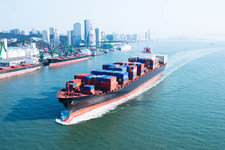5 Ways Factory Location Affects Your Order
Where should you manufacture? And how does a factory’s location affect doing business? When it comes to manufacturing a product, it’s a safe bet that finding and choosing a supplier that meets your needs will be one of your greatest challenges. When importers are selecting among an endless list of possibilities, factory location can often take a back seat to factors like price, product quality and shipping deadline. But what if we told you that factory location can, and almost always does, greatly impact all of those factors and more? That’s why in this bulletin article, we’re tackling one of the manufacturing industry’s most pressing questions. And if you haven’t considered these five ways that factory location will impact your order, we bet that you’ll consider them the next time you’re looking for a new supplier!
Factory Location and Travel Distance
This first point is perhaps the most obvious. Wherever you choose to manufacture, the factory’s physical distance from you will inevitably affect your ability to visit, meet with staff and management and check the status of your order. Let’s consider importers based in the United States, for example. Most aren’t able to personally visit their supplier every few weeks to check up on their order if, for instance, their supplier’s factory is located in Bangladesh. However, if the same importers are manufacturing in Mexico, a somewhat casual regular visit to the factory is much more feasible. There are also financial costs associated with traveling and accommodation that should be factored in to a visit.On a similar note, rather than personally traveling to assess order status and product quality, many importers opt to hire a third party inspection firm to send qualified auditors on their behalf. If you find yourself enlisting the help of a third party, even if the company has local staff in the country in which your supplier is located, there are always costs associated with getting to the factory. Maybe you’re manufacturing furniture at a factory in Foshan, China, and have quality control staff in Guangzhou, for example. Travel expenses to that particular location should be relatively low, since the two cities are quite close and mutually accessible. But what if you’re buying furniture in Maoming, and the closest city in which you have QC staff is Guangzhou? Now you should expect travel expenses for inspectors to be considerably higher. Even though Guangzhou, Foshan and Maoming are all located in the same province, Maoming is a more remote location, farther from Guangzhou. You should consider infrastructure – especially the presence of high-speed rail, in China’s case – in addition to distance.
Factory Location and Weather Conditions
A more frequently overlooked way that factory location can affect your order is the weather. Weather conditions can not only affect the integrity and delivery time, but the raw materials used in manufacturing your products as well. Let’s consider again that you’re an importer of furniture that is manufactured in Southern China. Guangdong Province is well-known as a manufacturing hub for furniture and many other consumer goods. Timber, as a raw material used in furniture production is most commonly harvested in the north. The dry and frigid winters characteristic of Northern China differ quite a bit from the hot and humid summers of Southern China. This difference can affect the composition and moisture content of the wood used in your furniture during production, transportation and storage. That’s why it’s important to keep in mind the effect local weather can have on your product.
Factory Location and Local Law
When it comes to manufacturing a product, particularly abroad, you’ll want to confirm that both you and your supplier are complying with local law. So be sure that there are no conflicts vis-à-vis your agreement and laws governing your factory location. One major concern for importers is the local minimum wage and its effect on the cost of producing factory locationgoods. Consider that, according to a 2013 report from the U.S. Department of State, minimum wage in Vietnam was as low as USD $50 per month and in Cambodia USD $100 per month. Also, consider that Thailand has one of the longest work weeks mandated at 48 hours. Both overtime and wages will affect the cost of goods sold. You may be able to leverage this information when negotiating an order with your supplier.Another important point to note here is the fact that enforcement of laws often depends on location. Regulations tend to be stricter in major cities in China. Not surprisingly, enforcement of those regulations is generally carried out with more force and regularity as compared to rural areas. Likewise, corruption may be an infraction that is overlooked in some areas, while strictly prohibited in others. Remember that local regulations and law enforcement should be considered when choosing a factory.
Factory Location and Worker Turnover
Worker turnover is a component of manufacturing that many importers neglect to consider when choosing a supplier. As we mentioned in an earlier article about the annual slowdown in manufacturing caused by Chinese New Year celebrations, China experiences a migrant labor turnover rate of between 15 and 30 percent each year. Due to the country’s immense size and population, much of the labor force employed in factories is made up of migrant workers, many of whom head home for the holiday and don’t resume work at the factory. Disruptions and delays in factory orders are common in China as a result of high worker turnover.
Conversely, some countries have conditions conducive to lower worker turnover. In Cambodia, for example, factories are often set up in localities where most of the inhabitants in the surrounding neighborhoods work there. In this case, workers are far less likely to suddenly “jump ship” and return to home, since their employer is located in their own backyard. This kind of situation is more common in smaller countries and those with a smaller population.
Factory Location and Shipping
Lastly, factory location can influence an order where shipping is concerned. If your merchandise will be traveling to its destination aboard a freighter, have you considered the distance from the factory to the outbound port? It could take significant time for a factory located far inland to send goods by truck to the pier from which your goods will depart. And don’t forget that it would likely be more difficult and costly for you to get a shipping container to a factory in a remote location. Factory location can affect both shipping cost and delivery time of your order.Conclusion
Many manufacturers are guilty of choosing suppliers based solely on factors like unit price and product quality, without considering some finer details. But what importers may miss on the surface is that more than price and quality is at stake when deciding on a supplier’s location. Five major ways in which factory location can impact your order include:
- Travel distance
- Weather conditions
- Local laws & regulations
- Worker turnover; and
- Shipping
Has the location of your factory ever adversely affected delivery times, cost, product integrity or other aspects of your order? Keep these five considerations in mind when choosing your next factory and you’re sure to get better results!
About John Niggl & InTouch Manufacturing Services
John Niggl is a Client Manager of InTouch Manufacturing Services, which provides solutions to quality and overseas manufacturing issues through product inspection and related quality control services. John is also Editor of the QC-related blog, Quality Wars.














